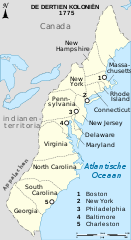By 1689, the land occupied by the American colonists stretched some one thousand miles along the Atlantic Coast but the settlers hugged the water. They had their backs to the continent and their eyes toward England. Most Colonists considered themselves transplanted Englishmen.
The Colonists saw themselves as communities that must, in themselves and their inception, become viable communities. They accomplished this by being self-deterministic. After all, when the settlers came to America, they found out that it was really them and not the crown that was going to protect them at first. They had to set up local governments capable of regulating their lives and protecting them from their enemies.
The Colonists were, therefore, alone in the New World. They were the pioneers and as pioneers, they had to become independent and capable of doing things themselves.
English institutions and practices had to change and adapt to this new environment if the settlers expected to survive. Institutions such as guilds, parliamentary autocracy, suffrage and the like had to change to meet the harsh life of the New World. The people had to become more democratic, tolerant and, above all, they had to learn other "trade methods" such as farming and carpentry if they wanted to live and survive in America.
American society changed but it was not only due to the environment. It was also because of three major revolutions that took place before the American Revolution. These revolutions are:
- The Glorious Revolution
The Glorious Revolution also called the Revolution of 1688 was the overthrow of King James II of England. Among other things, the English Parliament gained executive authority to compliment and strengthen its legislative authority. This Revolution in essence, allowed William and Mary to come to the English throne and the end of Absolute Monarchy in England. - The Diplomatic Revolution
At the end of the French and Indian War, Britain became the most powerful nation in the world. She could no longer practice balance of power politics because of her new status in the family of nations. Now everyone else would be her enemy. - The Maturing of the American Colonies
The final revolution happened in America itself. It was the maturation -- politically, economically and culturally of the English Colonies.
These three Revolutions would cause friction between America and Britain. Even the British recognized the new situation but they failed to implement experimentation in administration of the colonies. When America became a nation, the political practices present became institutionalized into the Constitution.
Direct representative government, the distribution of power between the respective levels of government, the significant role of the local government and the evolution of a political structure that was eventually institutionalized are all the legacies of the formative years of the Colonial character of America.
Thus, the ideas and practices transplanted from the Old World to the New were modified by experience to emerge as American principles, redefined particularly in the crisis of revolution, but predictable within the framework of provincial society.
Websites
For more information about this topic, you can check out these websites that discuss it in more depth.
Overview of Colonial America
From the About.com Guide to Ameican History, you can read this interesting overview of Colonial America from 1607-1754.
The Glorious Revolution
This website is devoted solely to the Glorious Revolution of 1688. It has a timeline or chronology of the events that took place during the Revolution. It also has an encyclopedia, quotations, and more.
Diplomatic Revolution of 1756
At the end of the French and Indian War (Seven Years War), diplomacy went through a major revolution. This page on the Wikipedia website, discusses this in some detail.
A New Colonial System
Read about the changes in the American Colonies that took place after 1763 in Colonial America on this page at the "From Revolution to Reconstruction and beyond website.

